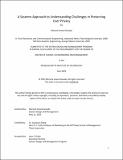A Systems Approach to Understanding Challenges in Preserving User Privacy
Author(s)
Govada, Mervine Anand
DownloadThesis PDF (4.005Mb)
Advisor
Zhang, Juanjuan
Terms of use
Metadata
Show full item recordAbstract
In recent years, enterprises' collection and processing of personal data has raised significant concerns about customer privacy. Ensuring customer privacy is vital for ethical data use and building trust. However, enterprises may need to enhance their efforts to safeguard customer privacy effectively.
Customers have become increasingly aware of how businesses handle their personal information and the potential risks that come with it; they proactively seek businesses that prioritize privacy protection. However, customer trust in how enterprises protect customer data varies, emphasizing the need for businesses to be transparent and communicate clearly with customers about their data protection practices. Clear and concise communication can include privacy policies and obtaining informed consent from customers.
Enterprises typically use anonymization, encryption, data masking, pseudonymization, and access control to protect customer privacy. The thesis explores two key technologies to enhance customer privacy and increase customer trust in enterprises: Federated Learning and Differential Privacy.
Preserving customer privacy is essential for building trust with customers, ensuring ethical use of personal data, and compliance with regulations. Improving privacy from a technology standpoint might not necessarily result in the customers' desired outcome. Therefore, it is essential to take the entire system into account. A systems approach can aid in analyzing and understanding the challenges of holistically preserving customer privacy from the perspectives of the customer, enterprise, and other stakeholders. By adopting a systems approach, enterprises can identify potential risks and challenges within the system, gain a better understanding of interconnections and interdependencies, and develop more effective solutions.
The systems approach involves identifying and analyzing subsystems, goals, and interactions, allowing enterprises to view their data practices holistically and identify potential privacy risks. By using a systems approach and leveraging technologies such as Federated Learning and Differential Privacy, enterprises can take a customer-centric approach to reduce privacy concerns.
Date issued
2023-06Department
System Design and Management Program.Publisher
Massachusetts Institute of Technology